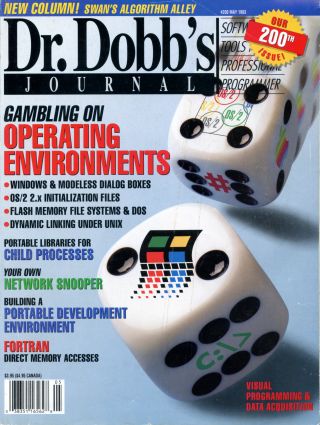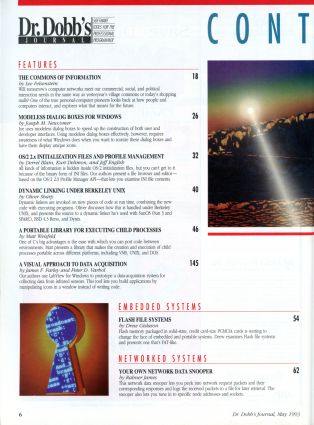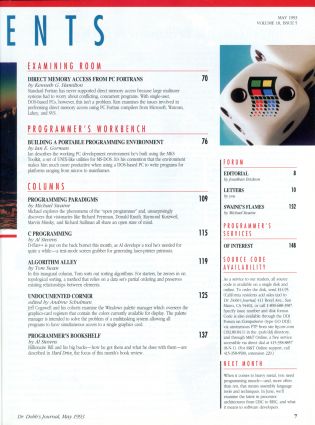
p.8 EDITORIAL
[author : Jonathan Erickson] #Edito
TABLE OF CONTENTS
FEATURES
p.18 THE COMMONS OF INFORMATION
[author : Lee Felsenstein]
Will tomorrow's computer networks meet our commercial, social, and political interaction needs in the same way as yesteryear's village commons or today's shopping malls? One of the true personal-computer pioneers looks back at how people and computers interact, and explores what that means for the future.
p.26 MODELESS DIALOG BOXES FOR WINDOWS
[author : Joseph M. Newcomer]
Joe uses modeless dialog boxes to speed up construction of both user and developer interfaces. Using modeless dialog boxes effectively, however, requires awareness of what Windows does when you want to iconize these dialog boxes and have them display unique icons.
p.32 OS/2 2.X INITIALIZATION FILES AND PROFILE MANAGEMENT
[author : Derrel Blain, Kurt Delimon, and Jeff English]
All kinds of information is hidden inside OS/2 initialization files, but you can't get to it because of the binary form of INI files. Our authors present a file browser and editor - based on the OS/2 2.0 Profile Manager API - that lets you examine INI file contents.
p.40 DYNAMIC LINKING UNDER BERKELEY UNIX
[author : Oliver Sharp]
Dynamic linkers are invoked on pieces of code at run time, combining the new code with executing programs. Oliver discusses how this is handled under Berkeley UNIX, and presents the source to a dynamic linker he's used with SunOS (Sun 3 and SPARC), BSD 4.3 Reno, and Dynix.
p.46 A PORTABLE LIBRARY FOR EXECUTING CHILD PROCESSES
[author : Matt Weisfeld]
One of C's big advantages is the ease with which you can port code between environments. Matt presents a library that makes the creation and execution of child processes portable across different platforms including VMS, UNIX, and DOS.
p.145 A VISUAL APPROACH TO DATA ACQUISITION
[author : James F. Farley and Peter D. Varhol]
Our authors use LabView for Windows to prototype a data-acquisition system for collecting data from infrared sensors. This tool lets you build applications by manipulating icons in a window instead of writing code.
EMBEDDED SYSTEMS
p.54 FLASH FILE SYSTEMS
[author : Drew Gislason]
Flash memory packaged in solid-state, credit card-size PCMCIA cards is starting to change the face of embedded and portable systems. Drew examines Flash file systems and presents one that's FAT-like.
NETWORKED SYSTEMS
p.62 YOUR OWN NETWORK DATA SNOOPER
[author : Rahner James]
This network data snooper lets you peek into network request packets and their corresponding responses and logs the received packets to a file for later retrieval. The snooper also lets you tune in to specific node addresses and sockets.
EXAMINING ROOM
p.70 DIRECT MEMORY ACCESS FROM PC FORTRANS
[author : Kenneth G. Hamilton]
Standard Fortran has never supported direct memory access because large multiuser systems had to worry about conflicting , concurrent programs. With single-user, DOS-based PCs, however, this isn't a problem. Ken examines the issues involved in performing direct memory access using PC Fortran compilers from Microsoft, Watcom, Lahey, and SVS.
PROGRAMMER'S WORKBENCH
p.76 BUILDING A PORTABLE PROGRAMMING ENVIRONMENT
[author : Ian E. Gorman]
Ian describes the working PC development environment he's built using the MKS Toolkit, a set of UNIX-like utilities for MS-DOS. It's his contention that the environment makes him much more productive when using a DOS-based PC to write programs for platforms ranging from micros to mainframes.
COLUMNS
p.109 PROGRAMMING PARADIGMS
[author : Michael Swaine]
Michael explains the phenomena of the "open programmer" and, unsurprisingly discovers that visionaries like Richard Feynman, Donald Knuth, Raymond Kurzweil, Marvin Minsky, and Richard Stallman all share an open state of mind.
p.115 C PROGRAMMING
[author : Al Stevens]
D-Flat++ is put on the backburner this month, as Al develops a tool he's needed for quite a while. - a text-mode screen grabber for generating laser-printer printouts.
p.119 ALGORITHM ALLEY
[author : Tom Swan]
In this inaugural column, Tom sorts out sorting algorithms. For starters, he zeroes in on topological sorting, a method that relies on a data set's partial ordering and preserves existing relationships between elements.
p.125 UNDOCUMENTED CORNER
[author : Andrew Schulman]
Jeff Cogswell and his cohorts examine the Windows palette manger which oversees the graphics-card registers that contain the colors currently available for display. The palette manager is intended to solve the problem of a multitasking system allowing all programs to have simultaneous access to a single graphics card.
p.137 PROGRAMMER'S BOOKSHELF
[author : Al Stevens]
Billionaire Bill and his big bucks - how he got them and what he does with them - are described in Hard Drive, the focus of this month's book review.
FORUM
p.10 LETTERS
[author : you]
p.152 SWAINE'S FLAMES
[author : Michael Swaine]
PROGRAMMER'S SERVICES
p.148 OF INTEREST

